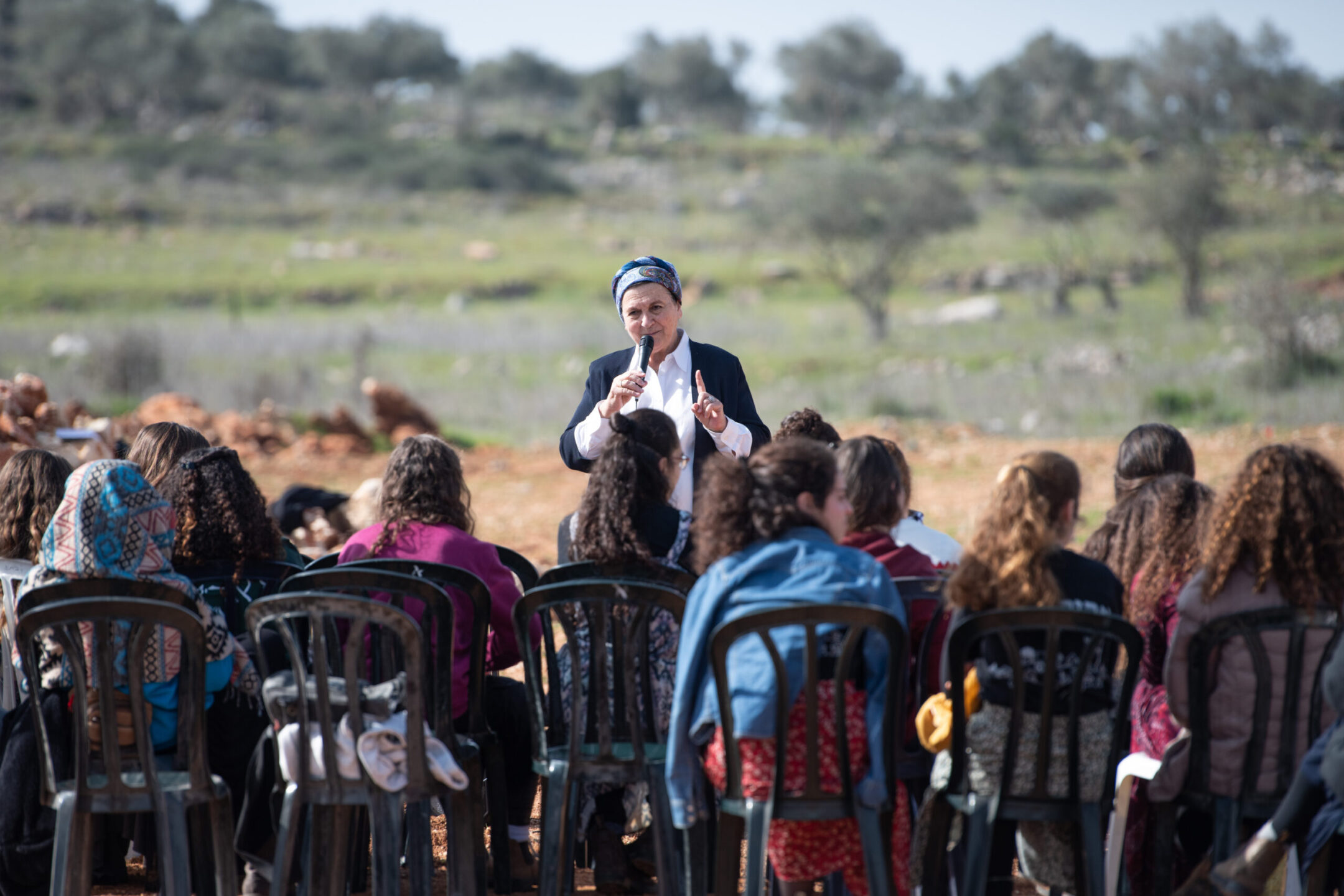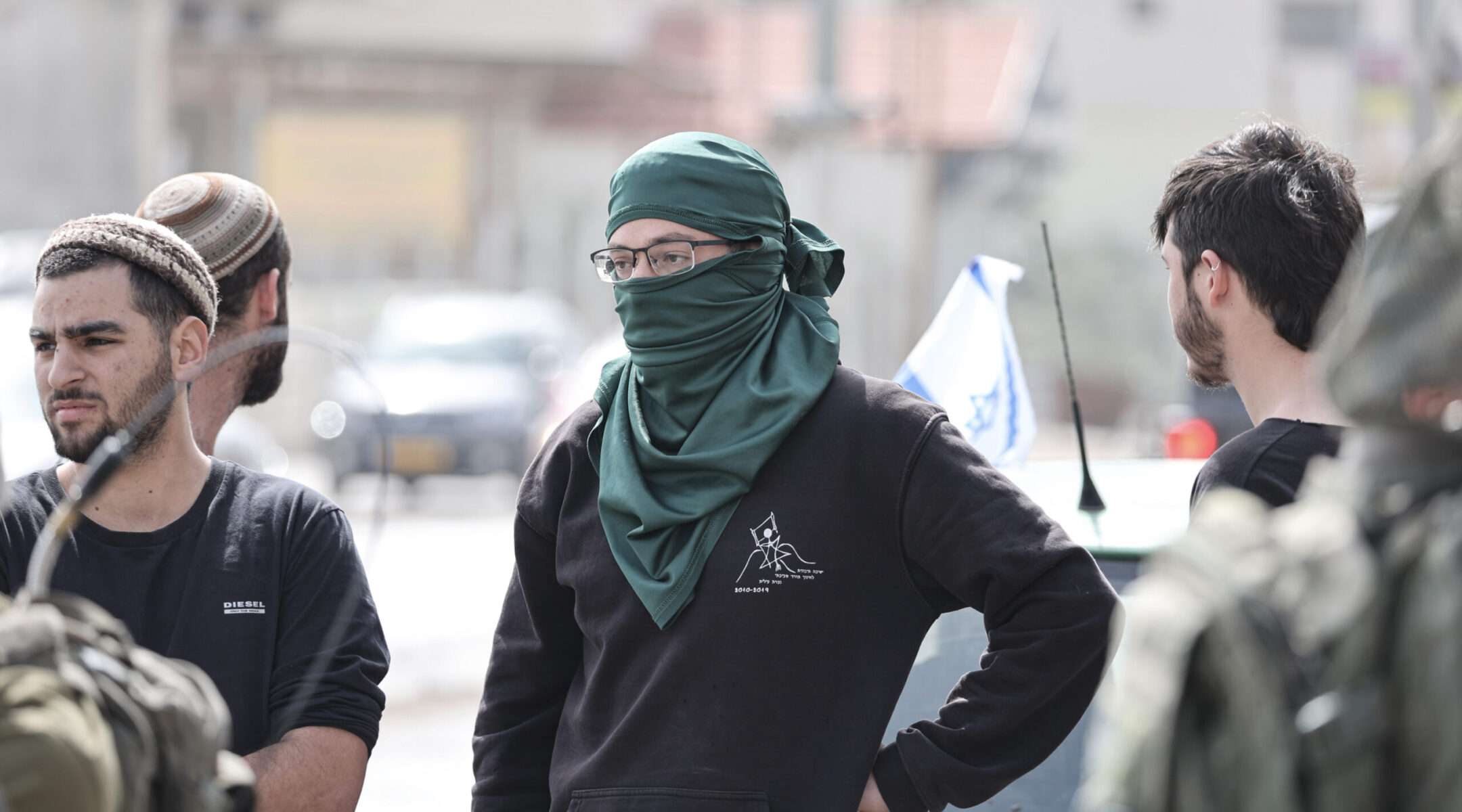JERUSALEM (JTA) – Despite resounding condemnation from across the world and efforts by Israeli prime minister Benjamin Netanyahu to denounce the outbreak of Jewish violence against Palestinians in the West Bank, settler leaders remain defiant and are backing members of their community involved in what has been described as the one of the worst events of Jewish mass rioting against Palestinians.
“In no way whatsoever do I condemn them,” veteran settler activist Daniella Weiss told the Jewish Telegraphic Agency.
“The shocking thing is that the government is unable to provide security to residents. This is very grave. I am not surprised that there was such an outburst,” said Weiss, a former mayor of the Kedumim West Bank settlement. “The pressure kept building up and the murder of the two brothers influenced people, as did the [recent] murder of two brothers in Jerusalem.”
The settlers’ attack centered on the Palestinian village of Hawara near Nablus, hours after a Palestinian gunman killed two young residents of the nearby Har Bracha settlement, Hillel Yaniv and his brother Yagel, 21 and 19. Hillel had just concluded his military service in a special program for yeshiva students and Yagel was due to finish a Magen David Adom emergency training course next week.
Following the terror attack, hundreds of settlers gathered to seek revenge from the neighboring village, unleashing their rage at residents who were not involved in the attack on the Yaniv family. They set alight 11 houses, damaged many others and burned 32 cars, according to initial data from the Palestine Red Crescent Society.
One settler said in a video clip from the scene as the rampage was underway that it was “a very moving experience.” With flames rising in the background, the settler, identified only as Rafael, added that the settlers “are torching everything that comes to hand.” In another video that was shared widely by critics of the settlers, a group of settlers is seen praying outside a Palestinian home on fire.
A large number of settlers also proceeded to Burin village, where they were “escorted” by soldiers, Burin resident Munir Qadoos told JTA. The settlers broke windows, slaughtered two sheep and stole others, burned a barn and pelted homes with stones, he said.
“I felt that it was going to be my last day alive,” Qadoos said. ”Settlers have attacked us many times, but never have they gone so far into the village.”
Human rights organizations have documented a steady increase in settler violence directed at Palestinians in recent years, citing hundreds of cases of vandalism, harassment of Palestinians working their fields or harvesting olive trees and nightly raids into West Bank villages. Settler leaders have disputed these claims, noting that most claims were dismissed by the Israeli police. They have also argued that only a small group of extremists, mostly teenagers, are responsible for these violent attacks.
Qadoos said that on Sunday night, rather than stop the settlers, IDF soldiers “fired tear gas at residents who were trying to defend themselves.” Two people were transferred to the hospital after being struck by stones and five treated locally, he said. “Everyone in the neighborhood is afraid but they also say we will not be moved from here. As I see it, things will get even worse.”
The army did not respond to a request for its account of what transpired in Burin.
By Monday morning, as the extent of the damage became apparent, Israelis began to grapple with the consequences of the attack, described by some in the media as a “pogrom,” and whether it was an ominous sign of authorities losing control over Jewish extremists in the West Bank.
Palestinian Authority officials said about 400 settlers joined the attacks. Eight Israelis were detained but all had been released by Tuesday morning.
The violence marks a significant “escalation” because of the large numbers of settlers involved and the sense that they have backers in the government, foremost Religious Zionism leader Bezalel Smotrich and Jewish Power leader Itamar Ben-Gvir, said Menachem Klein, professor emeritus of political science at Bar-Ilan University in Israel.
Klein predicted there would be further such attacks. ”The radical settlers see they are kings with Ben-Gvir and Smotrich in power,” he said. “We will see more of these because they are built into the power balance.”
It was a test for Netanyahu’s two-month old government, made up of the center-right Likud in partnership with Smotrich and Ben-Gvir’s far-right parties.
“There is no place for anarchy. We will not accept deliberate harm to innocent civilians,” Netanyahu told the Knesset on Monday. But his coalition partners, who are aligned with the settlers and have supported their actions, did not all share this sentiment. Smotrich, who serves as finance minister but also holds the portfolio of settler affairs in the defense ministry, endorsed the idea of harsh vengeance in the immediate aftermath of the killing of the settlers, liking a tweet by a settler leader, Davidi Ben-Zion, that called for “erasing Hawara today” and for “no mercy.”
Palestinian health officials said that settlers also attacked Sunday night other nearby villages and that a 37-year-old man was killed by Israeli gunfire in Zaatara, two others were shot and wounded, a third stabbed and a fourth beaten with an iron bar. Ninety-five other Palestinians were treated for tear gas inhalation.
The umbrella group for settlers, the Yesha Council, remained silent about the violence, offering no response to a query by JTA. The council serves as the political arm representing more than 500,000 Jewish settlers in the West Bank (but not in East Jerusalem and the surrounding neighborhoods, where another 375,000 Jewish Israelis reside). The council does not control individual settlements, which range in their political views from more moderate towns such as those in Ariel and in the Gush Etzion and Ariel region, and the smaller settlements and outposts considered to be home to extremists.

Settler leader Daniella Weiss speaks during a protest for the return to the Evyatar outspot, near the West Bank city of Nablus, Feb. 18, 2022.(Sraya Diamant/Flash90)
By Sunday night, Smotrich changed tack, saying, “It is forbidden to take the law into one’s own hands and create a dangerous anarchy which could cost lives.”
But Ziv Stahl, director of Yesh Din, a human rights group which promotes legal action against violent Jewish settlers, claims that Smotrich’s action on social media was highly significant and could be interpreted by settlers as showing the spirit that should guide their actions.
“Even though it’s not an official policy to be violent towards Palestinians, if Ben-Gvir is in charge of police and enforcement against settler violence and Smotrich is in charge of illegal construction, you can do the math of what message the settlers get from that.”
Weiss indicated she had no misgivings that the 37-year-old Palestinian, identified as Sameh Akatsh, who had just returned from participating in an earthquake relief mission in Turkey, had died. “If he was killed, he was killed,” she said.
JTA has documented Jewish history in real-time for over a century. Keep our journalism strong by joining us in supporting independent, award-winning reporting.






